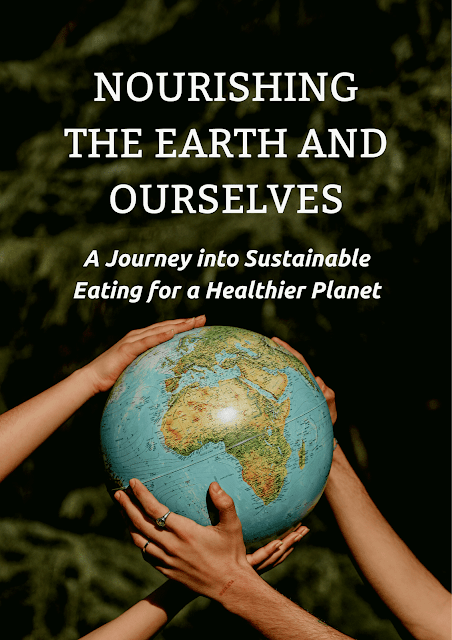Nourishing the Earth and Ourselves
 |
| Nourishing the Earth and Ourselves |
Nourishing the Earth and Ourselves
A Journey into Sustainable Eating for a Healthier Planet
Introduction:
In an era where environmental concerns are paramount, adopting sustainable practices in all aspects of life is crucial. One area where we can make a significant impact is through our food choices. Sustainable eating goes beyond personal health; it encompasses the well-being of the planet as well. In this article, we will embark on a journey to explore the concept of sustainable eating, delve into eco-friendly food choices, and uncover practical strategies to promote a healthier planet through conscious consumption.
Understanding Sustainable Eating:
a. Defining Sustainability:
Sustainable eating involves making food choices that support ecological balance, conserve natural resources, protect biodiversity, and minimize harm to the environment. It encompasses practices that prioritize long-term well-being, both for ourselves and future generations.
b. The Environmental Impact of Food Production:
Food production, including agriculture, livestock farming, and fishing, has a profound impact on the environment. Factors such as deforestation, greenhouse gas emissions, water usage, and waste contribute to climate change, loss of biodiversity, and soil degradation. Sustainable eating seeks to mitigate these negative effects through conscious decision-making.
Exploring Eco-Friendly Food Choices:
a. Plant-Based Power:
Incorporating plant-based foods into our diets is one of the most effective ways to reduce the environmental footprint of our meals. Plant-based proteins, such as legumes, lentils, tofu, and tempeh, offer nutritious alternatives to animal-based proteins. Increasing the proportion of fruits, vegetables, whole grains, and nuts in our meals not only supports our health but also helps reduce land and water usage, deforestation, and greenhouse gas emissions associated with animal agriculture.
b. Locally Sourced and Seasonal Delights:
Choosing locally sourced and seasonal produce reduces the carbon footprint associated with transportation and cold storage. By supporting local farmers and purchasing foods that are in season, we can enjoy fresher, more flavorful ingredients while reducing the energy and resources required to bring food from distant locations.
c. Sustainable Seafood Selection:
Overfishing and destructive fishing practices have devastating consequences for marine ecosystems. Opting for sustainably sourced seafood, certified by reputable organizations like the Marine Stewardship Council (MSC) or Aquaculture Stewardship Council (ASC), helps protect marine biodiversity and ensures that fishing practices are environmentally responsible.
d. Minimizing Food Waste:
Approximately one-third of the world's food production is wasted, contributing to greenhouse gas emissions and resource depletion. By planning meals, properly storing food, and repurposing leftovers, we can minimize food waste and make a positive impact on the environment.
Strategies for Sustainable Eating:
a. Mindful Consumption:
Practicing mindfulness involves being aware of the impact our food choices have on the environment. Before purchasing or consuming a product, consider its origin, production methods, packaging, and overall environmental footprint. Choose products that align with your values and support sustainable practices.
b. Supporting Sustainable Food Systems:
Engage with local farmers' markets, community-supported agriculture (CSA) programs, and sustainable food initiatives in your area. By supporting these initiatives, you contribute to the development of a more sustainable food system and foster connections with those who share your values.
c. Home Gardening and Composting:
Growing your own food through home gardening can be a rewarding and sustainable practice. Utilizing composting systems to recycle organic waste not only reduces landfill contributions but also provides nutrient-rich soil for your garden.
d. Advocacy and Education:
Share your knowledge and passion for sustainable eating with others. Engage in conversations, participate in community events, and support organizations that advocate for sustainable agriculture and food systems. Education and awareness are powerful tools in driving change on a broader scale.
Conclusion:
Embracing sustainable eating is an opportunity to nourish both ourselves and the planet. By making conscious choices about the foods we consume, we can significantly reduce our ecological footprint and contribute to a healthier planet for future generations. Through plant-based power, locally sourced and seasonal delights, sustainable seafood selection, and minimizing food waste, we can make tangible changes in our daily lives. By adopting mindful consumption, supporting sustainable food systems, engaging in home gardening and composting, and advocating for change, we become catalysts for a more sustainable and nourishing future. Together, let's embrace the power of sustainable eating and embark on a transformative journey towards a healthier planet.







Post a Comment